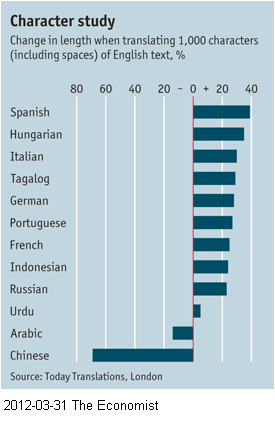Does the translated text convey the image AND style you want for your brand?
Quantity
A 78-character tweet or SMS/text in English is 24 characters long in Chinese and about 110 characters long in French or German.
The graph (click for more information) indicates that compared to Chinese, most translations will make a text longer. But even in English, things should be shorter than, for example, in German, French or Italian.
In short: When you translate your next blog post or sales brochure from English into Spanish, remember it will take more words to convey the message properly.
Join our subscribers – get the next blog post first. Just provide your email address.
New, wrong or different meaning(s) gained in translation
Denotation refers to the literal meaning of a word. But sometimes we use irony, whereby we say something but mean the opposite. Irony travels badly across languages. Unfortunately, giving something a different meaning than intended (humor) does not mean that a non-native speaker understands it. It certainly makes things harder for your translator.
To illustrate this further, countries use different words to achieve similar things. For instance, Tuesday May 1 was the date when trade unionists across the world joined May Day marches and other events to mark International Workers’ Day. In Germany the term used is Tag der Arbeit, which fits better with the term Labor Day. However, the latter is usually observed on the first Monday of September in Canada and the US – nowhere near May 1.
See also History of Labor Day – Chicago – Tuesday, May 4, 1886 – strike for 8-hour workday.
In short: Some things are hard to translate. Nevertheless, failing to communicate properly will neither help your reputation nor gain your clients’ trust.
Nuances
In addition to the above, the simple fact is that languages do not really translate very well or easily from one to the other. For instance, translating the nuances of French into American English idioms is really hard. The denotations of words are one thing. The connotations (i.e. an idea that is implied or suggested) are a whole other story, and never really parallel from one language to another.
In short: Things may lose some of their intended meaning when they get translated, so best practice means double-check to be sure (Auswertung der Februar-Umfrage – Evaluation of our February Survey – Technical Documentation blog from Britta Görs).
Good practice or best practice?
Needless to say, one person may translate things and the next one edits your brochure to ensure the right message comes across. Some translating services call this paying for the use of four eyes, because often the translation means that you basically need to re-write the document, whatever it is, to make sure it conveys the message you want to share. Here are some benchmarks to consider:
1. Computer dilemma: Remember the last time you wanted to fix a computer problem? The same thing tends to happen with properly translating your brochure – it will take more time and effort than you first thought.
2. Beware making risky, if not stupid, choices: People increasingly choose online translation servies without having any idea who ends up doing the work. Do you not wish to know who is teaching your child?
3. Making it work: Finding a great translator and editor takes time, requires that they understand your product/service and necessitates a close working relationship. It is worth it, however, because a bad translation may confuse your potential client, thereby causing you to lose the sale, something you do not want.
More resources on this topic:
– Don’t forget the language factor
– Why less targeted traffic is better than more drive-by traffic
– Does your translation account for non-native speakers?
– What is social media – definition by Andy Warhol
– Control, mediating and moderator variable – why they matter
– Why RSS fails with most blog readers
– Why culture and language matter and Twitter is no longer an option
A question for YOU
How do you decide what translation service to use and, most important, how do you make sure it gets done well? Please leave a comment! ![]()
Tip: Search for more ComMetrics and CyTRAP sources on best practice, benchmark, social CRM, SME, reputation, ROI, SEO Google, social media (click to query).
TL:DR
@ComMetrics Social media: Lost in translation? | (click on Tweet This, and voilà!)
The author: This post was written by social media marketing and strategy expert Urs E. Gattiker, who also writes about issues that connect social media with compliance, and thrives on the challenge of measuring how it all affects your bottom line.
His latest book, Social Media Audit: Measure for Impact, is scheduled to appear from Springer Science Publishers in Summer, 2012.
Connect with ComMetrics on Google+ or with the author using: Email | Twitter | Google+ | Xing


Pingback: Urs E. Gattiker
Pingback: Chris Isaac
Pingback: World Economic Forum
Pingback: Szezam
Pingback: Ken Hunter
Pingback: Marco Thio
Pingback: Carla Gentry CSPO
Pingback: Jay F Nelson
Pingback: Matthew D. Hudson
Pingback: Melissa & Christina
Pingback: Urs E. Gattiker
Pingback: Justice Mitchell
Pingback: Urs E. Gattiker
Pingback: CyTRAP
Pingback: Alex Hall
Pingback: Gaby Feile
Pingback: Gaby Feile
Pingback: Alex Hall
Pingback: Alex Hall
Pingback: Urs E. Gattiker
Pingback: Urs E. Gattiker
Pingback: World Economic Forum
Pingback: World Economic Forum
Pingback: InfoSec
Pingback: Alex Hall